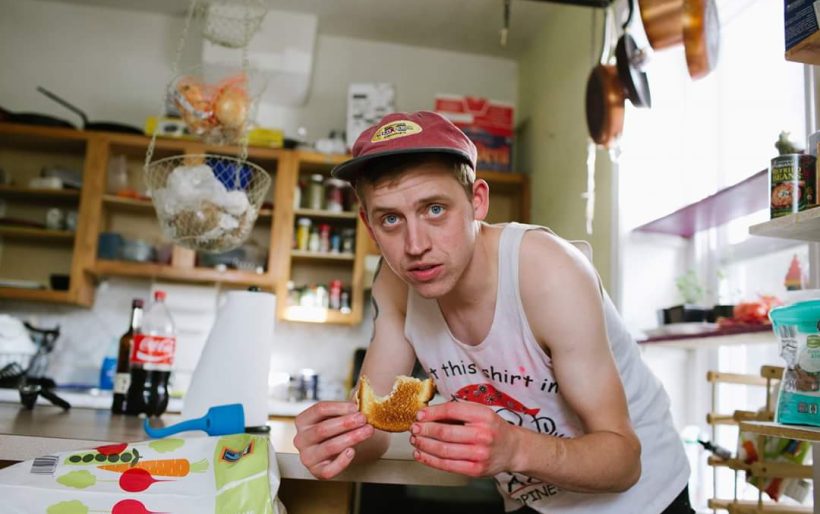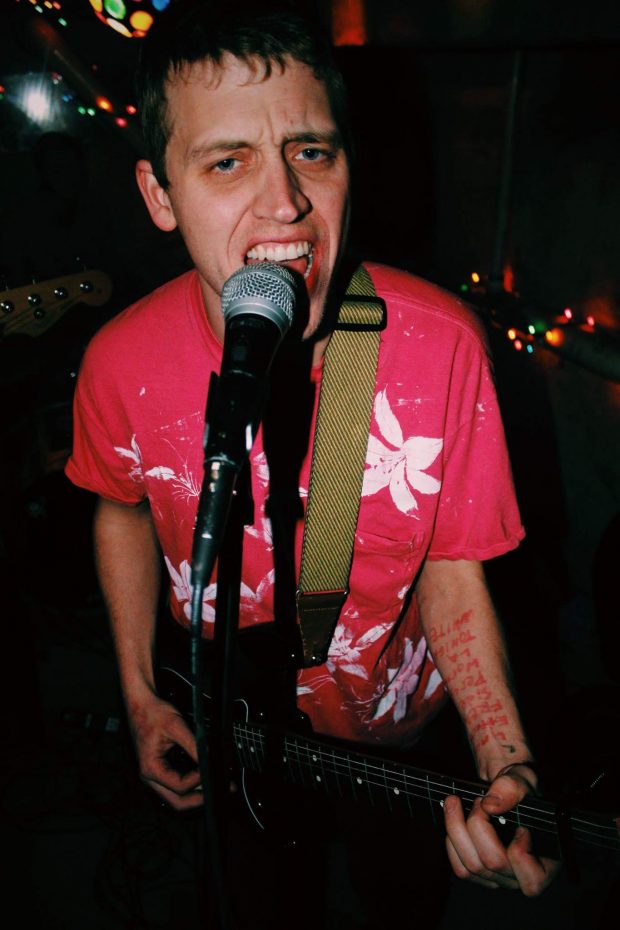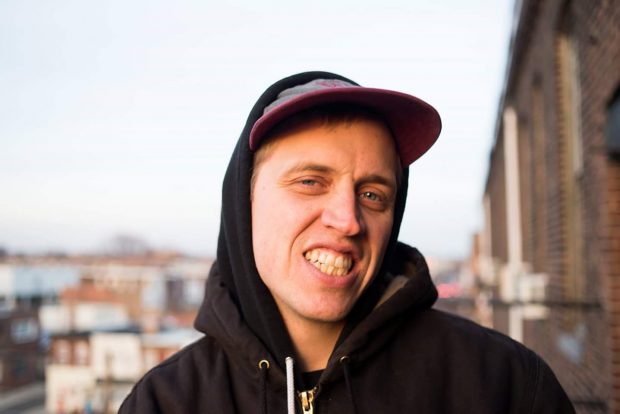
Curtis Cooper | photo by Abigail Townsend Photography | courtesy of the artist
PREMIERE: Curtis Cooper’s Messy is a visceral work of compelling catharsis
“I feel like all my closest friends are damaged,” says Philly’s Curtis Cooper. “And I don’t mean damaged in a bad way. I mean they have been beat down in one way or another and they’ve come back, and now they know the difference between having a good life and having a bad life, and they really appreciate what’s going on in their lives now. Those are the kind of people I want to spend time with.”
We’re talking one evening last week over falafel at Mama’s Vegetarian in Center City; “I love coming here,” Cooper comments, “there’s always somebody behind the counter wearing a Clique shirt.” And indeed, we’re handed our pita sandwiches from somebody wearing a jet black LIZARED tee. We grab a table and proceed to discussing Cooper’s personal and creative journey – through drugs, depression, and breakdowns – to their new album Messy, released this week.
It’s a powerful, propulsive record that on the one level is a form of catharsis for everything Cooper has been through over the past several years. The songwriting approach they debuted on last year’s Laughing in Line and honed on the local house show scene – which is studious and complex, built around interesting song structures and chord changes that go outside the pop-rock norm – is this time more amplified and dissonant. It’s a fitting tone, as Cooper lyrically unpacks pill addiction and struggles with sobriety (“Percs of Life”); mourns friends lost to suicide (“Everybody’s Dying”); and calls out the unhelpfulness of the religion-industrial complex (“JKayla”). The outlook on Messy feels very nonjudgemental, while also being visceral in conveying these emotions.
“When I wrote the songs and I guess, god, I was just losing my mind,” Cooper says. “I remember I was like ‘I’m never gonna be in that state of mind again.’ And then I was in that state of mind again a year later. And then I was like, ‘that’s never gonna happen again,’ and it happened again a month ago.”
Cooper is doing well now. Their most recent stint in the hospital resulted in increased care, increased openness and communication with family and friends. They’ve come out as nonbinary and are tremendously positive about their day-to-day existence. And though Cooper admits Messy can be difficult for them to listen to, it’s something they realize might help others who are in a similar place in life.
Cooper grew up in the Germantown section of Philadelphia, and studied music from a young age. Their dad taught them guitar at age 4, they studied piano at Settlement music school, they learned cello at Greenfield Music school. They know a LOT about theory, something that’s evident listening to the chord changes in their songs. Cooper talks about writing Laughing in Line, and strictly adhering to the rules taught in school: “the 6 is always minor, the 7’s are always flat 5 – or the 1,4,5 are major, the 2 is minor, or you can fuck with the 3, and when I do the key change it’s really conscious — like C major to E major includes the harmonic minor…”
Like, I totally know what they’re talking about to hear it in a song, but I would never be able to come close to articulating it like this, much less put it into practice. Another influence on Cooper’s musical outlook: School of Rock.
“It was great. I got Nero Catalano as my teacher, he’s the one who does the jazz nights at Time, and he’s in Work Drugs. He’s a beast,” Cooper says. “So, when I was 13 was when I started actually liking [music]. Before that, I had to do it, I did it for 20 minutes every day when I was a kid. I started doing it with him, and that’s when I found bands on my own. You know when you’re a kid and your parents give you stuff, people give you stuff? But then I found, like, Nirvana, I guess more classic rock stuff, and got into the guitar gods.”
By the end of Cooper’s teens, they took a break, and music is not what they studied in the higher education world.
“When I was younger I thought…I didn’t know you could do anything besides work in an office and do labor, you know what I mean?” Cooper says. “I thought, if you wanted to make a career out of music, you had to make it in a band, or something like that. I didn’t realize you could do music journalism, photography, you could manage bands, you could run blogs — there’s a million things around music — you could just do production, you know? So I wish I had done something like that in college, but I didn’t. I got a huge scholarship to Northeastern, and I went for math because I was good at math. And then I got fucking so bored! So bored. So I quit it, and I did psychology and sociology, and that’s what I graduated in.”
Cooper describes those college years as somewhat rough. Northeastern was very much a party-heavy, drinking-heavy, drug-heavy environment, and their memories of that time of their life are not tremendously positive; they were not in the healthiest headspace, and they weren’t playing music. But returning to Philly after school, Cooper refocused and dove back into the local punk scene – they had just begun seeing shows at spaces like Halfway House at age 15 and 16, before leaving Philly for Boston. Looking back on that scene, though, again, Cooper doesn’t have much fondness.
“I really bought into the system of being aggressive, of toxic masculinity, that sort of thing…of that stuff being cool,” Cooper remembers. “And then I kind of woke up, I guess. People seem to reward stupidity in a lot of scenes in music; I feel like the scene I’m in now rewards intelligence.”

Curtis Cooper | photo by Abigail Townsend Photography | courtesy of the artist
You can hear that in Laughing in Line, which is flush with Beatles-via-Elliott-Smith pop melodies and jazzy tones. Nina Simone is one of Cooper’s all-time favorites, and that record was their go at writing something in that spirit. But in the wake of it, they were hit with tragedy after tragedy. A friend was found dead on March 15th, the day Cooper had to play an album release party at Johnny Brenda’s; other loved ones were lost to suicide as the year unfolded. Cooper was no longer doing drugs, but still drinking heavily. When a new batch of incredibly intense songs, fueled by depression and led by the chaotic Minutemen-esque jazz punk of “Freak Out,” was brought to collaborators Scott Stitzer (drums and production) and Jack Zaferes (bass), they didn’t flinch. They knew exactly what Cooper was going through, because they too were friends with the people that inspired the songs; it was feelings they were experiencing as well.
“The more I’ve opened up to people, the more help I got,” Cooper says. “Like, I was dating someone and I told them that I was really suicidal all the time. They had no idea, you know what I mean? I just assumed everyone knew, even though I never said it. And you’d think when you tell someone that, you’re bringing them down to where you are, but in reality they fucking grab you and yank you back out.
“Then I told my parents,” Cooper continues. “Like, each year I’ve had a breakdown, I guess, so two years ago I told who I was dating, last year I told my family, and I’ve never gotten more support than that. So now I feel like the more people I tell, the better I feel about it, you know what I mean? I didn’t want it to be a secret anymore, I wanted it just to be out, and like, you know, who gives a shit, you know?”
Thoughts of openness and communication come up in the wandering “JKayla.” The song is about death, and named for two of Cooper’s lost friends: one named Kayla, the first friend Cooper knew who died when they were teenagers, and one named JK. The inspiration was attending a Catholic funeral for a loved one lost to suicide, and being appalled at a homily that described that person in terms of weakness and cowardice.
“You’re here in front of other people, god knows what they’re thinking, but his family was there, other people in that room could have been suicidal,” Cooper remembers. “And instead of being like ‘this is an opportunity to learn, you need to get help [if you feel this way], you need to talk about this kind of stuff,’ it was saying you need to squelch down these feelings and just suppress this shit.”
The song takes a stand against that outlook, but Cooper does not want it to be seen as anti-religious. “If religion makes you a good person, it’s good for you,” they say. “If it makes you homophobic, racist, promotes any type of hate, then it’s fucked up. It’s a cult!”
“JKayla” opens on a delicate stroll and moves feverishly across three distinct movements with no chorus – an approach Cooper drew from Paris songwriter Michelle Blades and her record Ataraxia. Later, we hear “Everybody Is Dying,” which touches on similar themes in a more brash and heavy, Deftones-esque style of warped funk (Cooper hears more Butthole Surfers). They note that for these moments of the record, in contrast to their Laughing in Line approach, the rules were completely broken and atonal dissonance ruled. “It’s just like, what weird shit can I do to make you realize how awful I feel?” Cooper says. “That’s kind of the whole vibe of the record: from a music stance, it’s like I’m trying to get you to lose your shit too.”
That’s not to say there aren’t moments of serenity throughout; “Interlude 1” is a whistling instrumental, no doubt inspired by one of Cooper’s favorites, Andrew Bird. And “Everyone Loves You” is melodic and delicate, and definitely beautiful – but beauty fraught with tension. “That chord progression, it sounds like you’re flowing through, but it’s very erratic,” Cooper says. “It’s one of the most erratic chord progressions I’ve ever written; there’s no repeat, each verse is different in a different way. So I built up the harmonies on it, but you don’t have an opportunity to get comfortable with it, you don’t have an opportunity to be like oh, this harmony’s nice, and then it changes. It’s definitely an uneasy feeling of beauty.”
So what now that Cooper has gotten Messy out of their system? They laugh, and say “My therapist thinks I should write happier songs.”
But, the next body of work is moving in that direction of finding comfort with oneself. Cooper’s voice has always had a bit of a Jeff Buckley tone to it, and they tell me their next set of songs explores it even moreso. “It’s a prettier voice, a falsetto, which I didn’t think I was allowed to do because men aren’t supposed to sing high.” But now Cooper embraces that register of their voice, and the songs are coming easily. “They’re more acoustic-based,” they add. “And [the next record] is going to be a lot about gender and happiness. It helped coming out as nonbinary because it takes a lot of pressure off yourself. ‘I’m supposed to look this way, I’m supposed to act this way.’ All that crap is worked out. I’m definitely writing happy songs now, or at least positive songs now. But it takes a lot out playing these ones.”
Beyond creatively, Cooper find themself doing very well right now personally and spiritually. Their relationship with their friends has strengthened, their family bonds have tightened.
“This is the best I’ve ever done,” Cooper says. “My brother and I didn’t use to be that close, but I tell him I love him all the time. I tell my friends I love them.”
A solid support network is not to be underestimated, but that doesn’t mean wearing blissed out blinders from day to day. Which returns to Cooper’s initial thought about being drawn to people who are damaged.
“I want people who can support me and I can support them,” Cooper reflects. “We all see the realities of the world – it’s not just like this happy place. But it’s also not just a sad place, it’s not like we’re all sitting around sad — we’re some of the happier people I know. It’s just the shit we’ve done and it’s shit that we’ve overcome, and now we are where we are today, and we’re all together, I guess. It’s a very supportive group of people I’ve found.”

Curtis Cooper | photo by Abigail Townsend Photography | courtesy of the artist